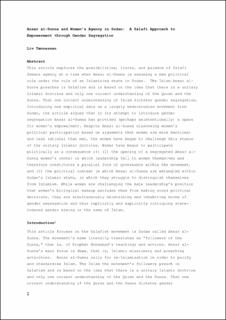| dc.contributor.author | Tønnessen, Liv | |
| dc.date.accessioned | 2022-11-03T17:37:19Z | |
| dc.date.available | 2022-11-03T17:37:19Z | |
| dc.date.issued | 2016-12-01 | |
| dc.identifier | oai:www.cmi.no:4905 | |
| dc.identifier.citation | in Frontiers: A Journal of Women's Studies vol. 37 no. 3 pp. 92-124 | |
| dc.identifier.issn | 0160-9009 | |
| dc.identifier.uri | https://hdl.handle.net/11250/3029991 | |
| dc.description.abstract | This article explores the possibilities, limits, and paradox of Salafi female agency at a time when Ansar al-Sunna is assuming a new political role under the rule of an Islamizing state in Sudan. The Islam Ansar al-Sunna preaches is Salafism and is based on the idea that there is a unitary Islamic doctrine and only one correct understanding of the Quran and the Sunna. That one correct understanding of Islam dictates gender segregation. Introducing new empirical data on a largely understudied movement from Sudan, the article argues that in its attempt to introduce gender segregation Ansar al-Sunna has provided (perhaps unintentionally) a space for women’s empowerment. Despite Ansar al-Sunna disavowing women’s political participation based on arguments that women are more emotional and less rational than men, the women have begun to challenge this stance of the unitary Islamic doctrine. Women have begun to participate politically as a consequence of: (1) the opening of a segregated Ansar al-Sunna women’s center in which leadership fall to women themselves and therefore constitutes a parallel form of governance within the movement, and (2) the political context in which Ansar al-Sunna are entangled within Sudan’s Islamic state, in which they struggle to distinguish themselves from Islamism. While women are challenging the male leadership’s position that women’s biological makeup excludes them from making sound political decisions, they are simultaneously maintaining and inhabiting norms of gender segregation and thus implicitly and explicitly critiquing state-induced gender mixing in the name of Islam.
A preprint of the article can be downloaded as a PDF file above | |
| dc.language.iso | eng | |
| dc.relation | Frontiers: A Journal of Women's Studies | |
| dc.relation | 3 | |
| dc.relation.ispartof | Frontiers: A Journal of Women's Studies | |
| dc.relation.ispartofseries | Frontiers: A Journal of Women's Studies vol. 37 no. 3 | |
| dc.relation.uri | https://www.cmi.no/publications/4905-ansar-al-sunna-and-womens-agency-in-sudan | |
| dc.subject | Sudan | |
| dc.title | Ansar al-Sunna and Women’s Agency in Sudan: A Salafi Approach to Empowerment through Gender Segregation | |
| dc.type | Journal article | |
| dc.type | Peer reviewed | |
| dc.identifier.doi | 10.5250/fronjwomestud.37.3.0092 | |
| dc.identifier.cristin | 1415987 | |
